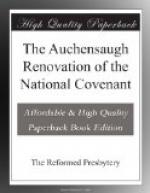Beside these two more general doctrines which were chiefly insisted upon, he observed several others pertinently deducible from the words, as first, That unfaithful dealing in God’s covenant will breed distance and estrangement from God. This is implied in the children of Israel and Judah seeking the Lord, asking the way to Zion, &c.; their asking the way to Zion, importing that they had forgotten the right way of worshipping God, and that their sins had made a sad separation between them and their God. Secondly, That it is necessary that persons become sensible of their sin against God, and of his anger against them, and lay these things to heart, that they may be concerned about reconciliation with God, and reform their lives. Thirdly, That the kindly exercise of repentance in a backsliding people lamenting after the Lord, and setting about to renew their covenant with him, hath an effectual influence to unite and cement the divided people of God: thus in the text the children of Israel and Judah, whom their iniquities had long and sadly divided, are uniting together in this desirable frame of weeping and seeking the Lord their God, and making a perpetual covenant with him. This doctrine he proved and applied briefly as the time would permit, both because of its native result from the text, and because of his own, and our sincere desire to see a holy union and communion, in the way of truth and duty effected by returning to the Lord, and renewing the covenant with him, as among all the godly, so especially among those that profess their dissent from, and dislike of the corrupt courses of the times.
Sermon being ended, after prayer, the covenants were first read according to the Directory for renewing the solemn league and covenant, prescribed by the Act of the General Assembly at Edinburgh, 6th October, 1648, post meridiem, entitled, Act for renewing of the Solemn League and Covenant; and, thereafter, the following Acknowledgment of Sins was also read: after which, prayer was made, containing




